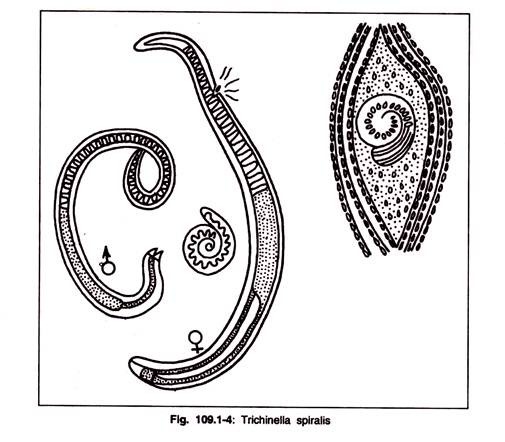
trichina [trih-kahy-nuh] ExamplesWord Origin noun, plural tri·chi·nae [trih-kahy-nee] /trɪˈkaɪ ni/.
- a nematode, Trichinella spiralis, the adults of which live in the intestine and produce larvae that encyst in the muscle tissue, especially in pigs, rats, and humans.
Origin of trichina 1825–35; New Latin Greek tríchina, noun use of feminine of tríchinos of hair. See trich-, -ine1 Examples from the Web for trichina Historical Examples of trichina
In the pig, the trichina, if present, may always be found in the muscles of the eye.
Cooley’s Practical Receipts, Volume II
Arnold Cooley
Some species are of microscopic size; as the Trichina worm, which is about 1/20 in.
Elementary Zoology, Second Edition
Vernon L. Kellogg
The Trichina is a nematode worm, and not an insect, as it was at first called.
Animal Parasites and Messmates
P. J. Van Beneden
Nearly 50,000 Trichina were counted in an infected leg of pork (Rupprecht).
T. Spencer Cobbold
The trichina capsules commonly measure about one-fifth of a line long, and the coiled worm within is scarcely a half-line long.
A System of Practical Medicine By American Authors, Vol. II
Various
British Dictionary definitions for trichina trichina noun plural -nae (-niː)
- a parasitic nematode worm, Trichinella spiralis, occurring in the intestines of pigs, rats, and man and producing larvae that form cysts in skeletal muscle
Word Origin for trichina C19: from New Latin, from Greek trikhinos relating to hair, from thrix a hair trichina in Medicine trichina [trĭ-kī′nə] n. pl. tri•chi•nae (-nē)
- A small, slender parasitic nematode (Trichinella spiralis) that infests the intestines of various mammals and whose larvae move through the bloodstream, becoming encysted in muscles.
 Liberal Dictionary English Dictionary
Liberal Dictionary English Dictionary